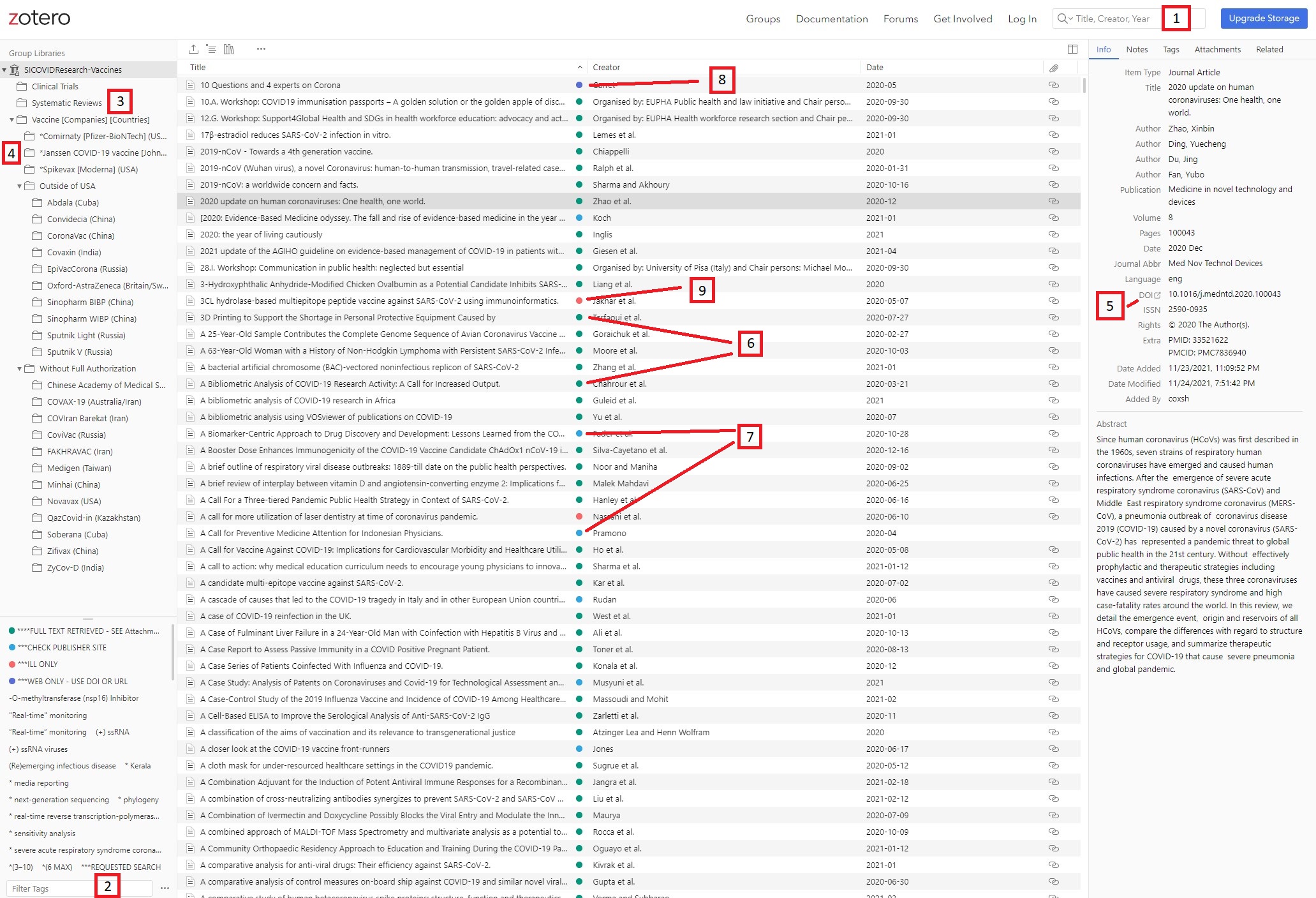COVID-19 Citation Databases
- COVID-19 Funding Guide: Introduction
- Opportunities and Websites
- Search Terms
- COVID-19 Citation Databases
Introduction
These databases are a repository of all citations accessible to the Smithsonian Libraries and Archives, comprised of COVID-19 related literature and curated, non-scholarly content. For the benefit of the Smithsonian community, these searchable databases include comprehensive coverage of scholarly articles, reports, and working papers, as well as newspaper and periodical articles, press releases, videos, and websites (governmental and corporate).
You can use this database to:
- Find the latest COVID-19 related citations without needing to search in complex databases or Google.
- Request PDFs of articles not freely available by emailing the contact at the bottom of this page (restricted to Smithsonian personnel).
Developed by Stephen Cox of the Smithsonian Libraries and Archives using the Zotero citation management program, this database is a product of ongoing searches of Cochrane Library, Google Scholar, ProQuest Coronavirus Research Database (PCRD), ProQuest Publicly Available Content Databases (PACD), PubMed, SciELO, Web of Science Core Collection, Zoological Record, and of the continued utilization of Google News Alerts. Searches and maintenance follow a weekly schedule based on citation index refresh frequency and duplicate citation count. Subject databases are highly curated and updated regularly. Quarterly databases include only literature published in a given three month span. New citations are added to our COVID-19 Citation Databases every business day.
Database Locations
Subject Databases
-
Non-Scholarly Resources: https://www.zotero.org/groups/2631723/sicovidresearch-non-scholarly/library
-
Occupant Health: https://www.zotero.org/groups/3411160/sioccupanthealth/library
-
RNA Sequencing: https://www.zotero.org/groups/2849987/sicovidrna/library
-
Risk Assessment: https://www.zotero.org/groups/2548568/siriskassessment/library
-
Vaccine Research: https://www.zotero.org/groups/3758752/sicovidresearch-vaccines/library
Quarterly Databases
2020
-
Quarter 1: https://www.zotero.org/groups/2892439/sicovidresearch-2020q1/library
-
Quarter 2: https://www.zotero.org/groups/2892441/sicovidresearch-2020q2/library
-
Quarter 3: https://www.zotero.org/groups/2892443/sicovidresearch-2020q3/library
-
Quarter 4: https://www.zotero.org/groups/2892448/sicovidresearch-2020q4/library
2021
-
Quarter 1: https://www.zotero.org/groups/2892449/sicovidresearch-2021q1/library
-
Includes scholarly articles published through February 28, 2021
-
The numbers in the above image correlate with the key points below.
Searching
- Use the dialog box on the upper right-hand corner of the page to search Title, Creator (Author/Editor/Institution), or Date/Year (#1)
-
To search author, database, or publisher generated tags, use the Filter Tags dialog box on the lower left-hand side of the page (#2)
- ****FULL TEXT RETRIEVED - SEE Attachments TAB, ***CHECK PUBLISHER SITE, ***WEB ONLY - USE DOI OR URL, and ***ILL ONLY keywords/tags can be found at the top of the Tags box and clicked on to sort articles by availability.
- Sort by Title, Creator, or Date of Publication by clicking on the head of each column in the middle frame.
Keywords
Librarian-curated keyword/tag folders can be found on the left frame of the page.
- The keyword/tag folders are updated biweekly.
-
Types of Keyword/Tag folders
-
Clinical Trials or Systematic Reviews and Meta-Analyses (#3)
- Curated folders
- Includes folder specific to COVID-19 systematic reviews and meta-analyses
-
Database Topic Folders (#4)
-
Folders delineating the who, what, when, where, and why of the database's main topic
- For Vaccines, this section shows Full Authorized in US, Fully Authorized Outside US, and Not Yet Authorized
- Further delineation by Brand Name, Company, and Country of Origin
-
Folders delineating the who, what, when, where, and why of the database's main topic
-
Clinical Trials or Systematic Reviews and Meta-Analyses (#3)
Retrieve Articles
- Click the DOI or URL icon in the right frame to go to the publisher’s webpage. (#5)
-
A green dot to the right of a title means the full-text PDF has been retrieved and may be requested by emailing the contact librarian listed below. (#6)
- For Smithsonian personnel only, due to copyright considerations.
-
A blue dot means the publisher's site should be checked for full-text access. (#7)
- Click on the DOI or URL metadata header in the right frame after selecting an article.
-
A purple dot means the article is only available via the web. (#8)
- Click on the DOI or URL in the metadata frame. (See #5)
-
A red dot means the article must be procured elsewhere. (#9)
- SI personnel can order articles via ILLiad (interlibrary loan). If you need an ILL account, contact your branch librarian.
Create Bibliographies
-
Highlight articles then click on the books icon above the Title header in the middle frame.
- Export in desired format (e.g., APA, MLA).
Contact
For more information about this database, contact Stephen Cox, Smithsonian Libraries and Archives (coxsh@si.edu).

